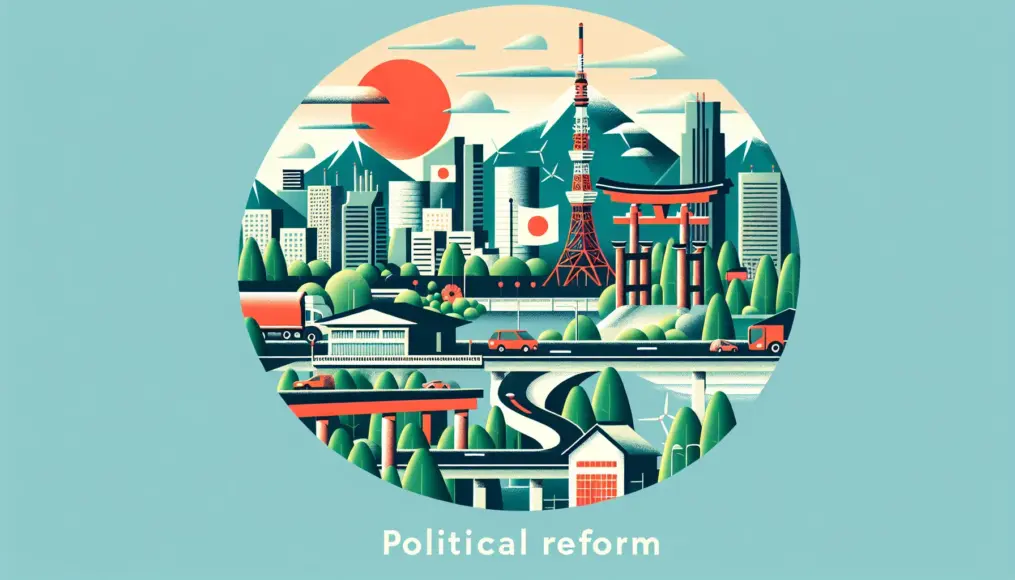Political reform is a crucial topic that significantly impacts our lives and the future of society. In Japan, it’s essential to consider what kind of reforms are needed, especially when taking into account the historical context. Political reform goes beyond mere policy changes; it represents a vital step toward reflecting democracy and the voices of the people.
Japan faces a myriad of challenges in the modern era. To achieve economic growth and improve social welfare, what specific political reforms are necessary? Having a clear vision for the future is key to making our lives better. In this article, we will delve into the future of Japan shaped by political reform.
- Exploring the historical background of political reform and its impact
- The challenges facing modern Japan and the necessity for reform
- How future political reforms will affect our lives
The History of Political Reform and Its Impact
Political reform in Japan is a significant topic with deep historical roots. Notably, the post-war political transformations were pivotal events that dramatically reshaped the nation. The various reforms introduced during this period have left a lasting impact on our lives and society today. Political reform isn’t just about changing policies; it’s also a crucial step in reflecting the voice of the people.
In this section, we’ll take a closer look at the post-war political changes and their ongoing effects. By understanding how past reforms have been inherited in the present and their impact on our society, we can better grasp the necessity for future political reforms.
Post-War Political Transformation
After World War II, Japan underwent significant changes to establish a new political system. This era saw amendments to the constitution and revisions to the electoral system, laying the groundwork for a thriving democracy. In particular, the Japanese Constitution enacted in 1947 emphasized citizens’ rights and contributed to greater political transparency.
Moreover, the post-war political reforms were closely tied to economic recovery. By reevaluating the relationship between politics and the economy, the aim was to stabilize society as a whole. These reforms have become foundational elements of modern Japanese society.
- Post-war political reforms contributed to the establishment of democracy.
- The new constitution emphasized citizens’ rights.
- Reevaluating the political-economic relationship contributed to societal stability.
The Impact of Past Reforms on Modern Society
Past political reforms have had a profound impact on contemporary Japanese politics and society. For instance, electoral system reform has been essential in achieving a political landscape that better reflects the voices of the people. This has allowed for a broader range of opinions to be incorporated into the political sphere.
Additionally, the democratic values established through these past reforms have fostered a sense of political participation among citizens. This has led to increased interest in politics and a more active movement toward building a better society.
For those looking to deepen their understanding of historical political reforms, we recommend exploring the related topic, “Surprising Habits and Their Impact on Constitutional Amendments.” This article delves into how constitutional amendments affect our daily lives and examines the cultural and habitual contexts behind them. If you’re interested, be sure to check it out here: Surprising Habits and Their Impact on Constitutional Amendments.
- Electoral system reform has become a key factor in reflecting the people’s voices.
- Democratic values are promoting political participation among citizens.
- Past reforms continue to influence modern politics.
Political Challenges Facing Modern Japan
Contemporary Japan is grappling with significant issues such as economic growth and social welfare. These challenges are closely intertwined with political reform, which will play a crucial role in shaping the country’s future direction. There is a pressing need to address the problems faced by citizens through political reform in order to build a sustainable society.
In this section, we will explore the interplay between economic growth, political reform, and changes in social welfare policies. We will investigate how each of these challenges influences politics and what implications they hold for our daily lives.
Economic Growth and Political Reform
Economic growth is essential for a nation’s development. However, sustaining this growth requires political reform. Japan, in particular, faces hurdles such as a declining birthrate and an aging population, making it urgent to reevaluate existing policies.
Political reform is necessary to devise new strategies that can invigorate the economy. For instance, easing regulations and implementing support measures for businesses are vital steps to enhance the business environment and encourage investment. These changes could also create more job opportunities for young people, contributing to overall economic revitalization.
- Political reform is crucial for economic growth
- Easing regulations and business support measures improve the business environment
- Increasing job opportunities for young people promotes economic revitalization
Social Welfare and Policy Changes
Social welfare is a key factor in improving the quality of life for citizens. Political reform is needed to reassess the social welfare system. In particular, improving healthcare and pension systems presents a significant challenge for an aging society.
Furthermore, securing financial resources is essential to enhance social welfare. Establishing sustainable social welfare systems through tax increases or new funding sources is imperative. This would create a society where all citizens can live with peace of mind.
- Reevaluation of the social welfare system is necessary
- Improving healthcare and pension systems is crucial
- Building a sustainable social welfare system through financial resource security
The Potential Impact of Future Political Reforms
Future political reforms have the potential to bring significant changes to our society and daily lives. In particular, as technological advancements continue to accelerate, we can expect a profound transformation in the way politics operates. Additionally, Japan’s role in the international community is becoming increasingly important, calling for political reforms that take a global perspective. Let’s explore how these factors might shape the future of politics.
In this section, we will delve into the relationship between technological innovation and politics, as well as Japan’s role on the global stage. By understanding the potential impact of future political reforms, we can consider how to improve our society for the better.
The Relationship Between Technological Innovation and Politics
Technological innovation is opening up new possibilities for politics. Notably, advancements in information and communication technologies, along with AI, are being highlighted as tools to enhance political transparency and efficiency. This shift makes it easier for citizens to engage in the political process, increasing the likelihood that a broader range of opinions will be reflected.
Moreover, the utilization of digital technologies is expected to expedite election processes and policy-making. This will enable politics to respond more flexibly to the needs of the public. As technology continues to evolve, we can anticipate a future where politics feels more accessible and relatable.
- Enhancing political transparency through technological innovation
- Easier reflection of citizens’ opinions
- Expedited election and policy-making processes
Japan’s Role in the International Community
Japan plays a crucial role in the international community. Through political reforms, there is a pressing need for the country to actively address global challenges. Specifically, how Japan demonstrates leadership in issues such as environmental concerns, human rights, and economic globalization is under scrutiny.
By strengthening its collaboration with the international community, Japan can create new value. This not only fosters international trust but also positively influences domestic political reforms. Future political reforms will be a key avenue for Japan to thrive on the world stage.
- The importance of Japan’s international role
- The need to address environmental and human rights issues
- The impact of international collaboration on domestic political reforms
Impact and Expectations on Citizens’ Lives
Political reform is a crucial factor that directly influences the lives of citizens. As civic participation expands, trust in politics increases, highlighting the importance of individuals forming their own opinions. This environment fosters high hopes for building a better society.
Moreover, as political reform progresses, an improvement in quality of life is anticipated. By revising policies to address the needs of the populace, a solid foundation for achieving a richer life is established. In this section, we will delve into the expansion of civic participation and the enhancement of life quality.
Expansion of Civic Participation
Civic participation is a fundamental element of democracy. As political reform advances, citizens are presented with more opportunities to engage in politics. This results in a greater reflection of the public’s voice in political decisions, allowing for a wider range of opinions to be considered.
With the expansion of civic participation, interest in politics rises, and citizens begin to take responsibility for their own lives. Consequently, we can expect a revitalization of local communities and an overall improvement in the quality of democracy across the nation. When citizens actively participate, politics becomes more relatable and accessible.
- Civic participation is the cornerstone of democracy
- The public’s voice is more likely to be reflected in politics
- This leads to revitalization of local communities
Improvement in Quality of Life
Political reform also contributes to enhancing the quality of life. As policies are reviewed to meet the needs of citizens, improvements in areas such as education, healthcare, and welfare are expected. This, in turn, aims to enrich the lives of individuals.
Furthermore, political reform is anticipated to bolster the overall infrastructure and services within society, creating an environment where people can live with peace of mind. As economic growth occurs alongside an increase in quality of life, the happiness of citizens is likely to rise as well. It is expected that politics will play a significant role in directly impacting the lives of the populace.
If you’re interested in this topic, you might also enjoy this article, “Exploring the Impact and Background of Inheritance Tax Reforms.” It provides an in-depth look at how changes in inheritance tax laws affect families and the economy in Japan, helping to understand how policy reforms can influence citizens’ lives.
- Policies are revised to meet citizens’ needs
- Improvements in education, healthcare, and welfare
- Enhancements in overall infrastructure and services
Conclusion
Political reform is a vital element for Japan’s future, significantly impacting citizens’ lives and societal development. It’s a broad subject that deserves discussion, ranging from post-war political changes to contemporary challenges and future possibilities. As citizen participation expands and technological innovations advance, it’s increasingly important for each individual to engage with politics.
Addressing specific issues such as economic growth and improvements in social welfare will lay the groundwork for achieving a better quality of life. Future political reforms must also incorporate new perspectives aimed at building a sustainable society, including Japan’s role in the international community.
- Political reform is crucial for shaping Japan’s future
- Expanding citizen participation enhances political transparency
- Economic growth and social welfare improvements boost quality of life
Political reform is a topic that deeply affects our lives, so we’d love to hear your thoughts and opinions. Please share your comments with us!



Comment